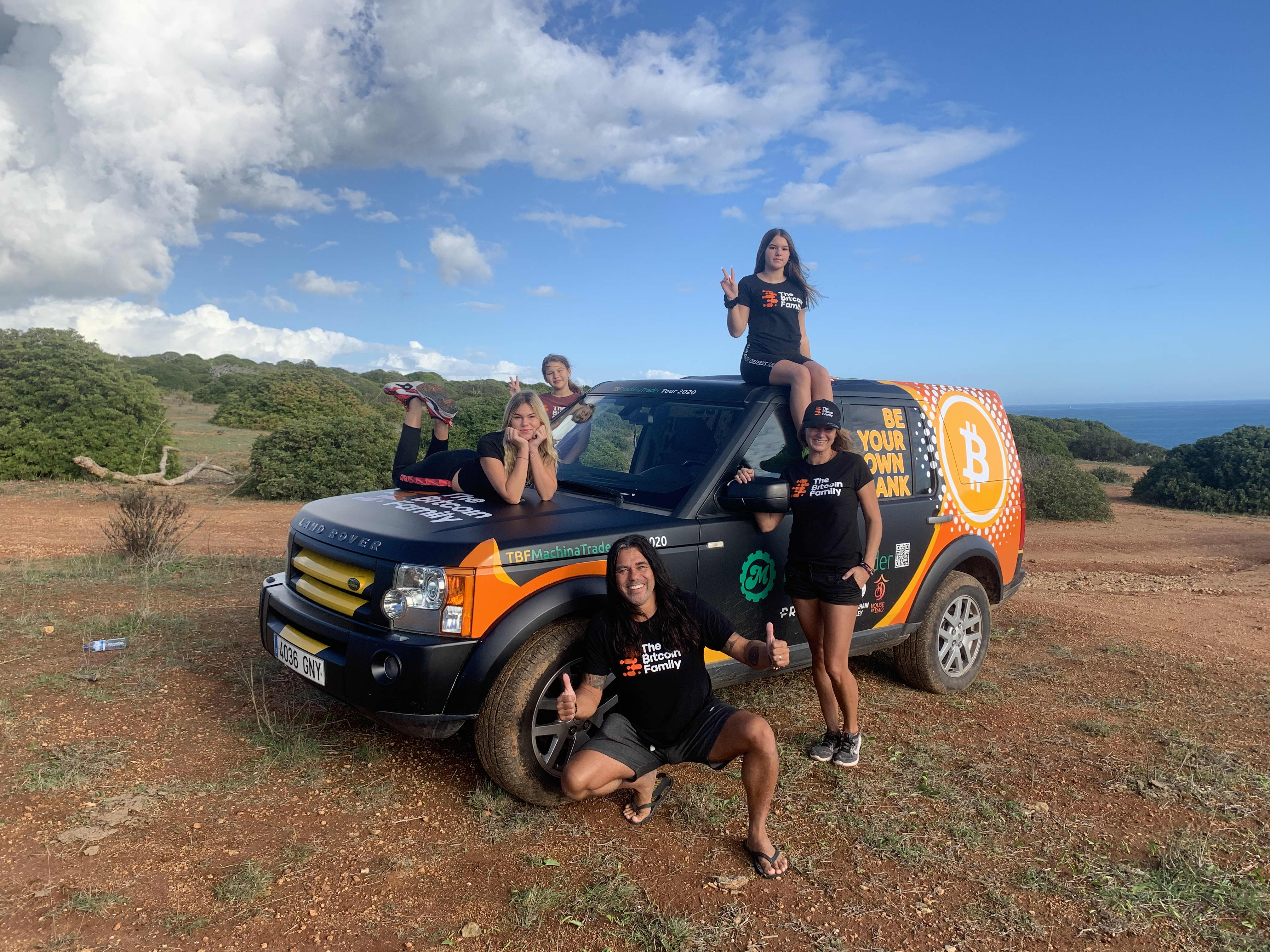More On: Bitcoin
How much 6 popular cryptocurrencies lost in 2022 ?
How people who watch the market were wrong about bitcoin in 2022
Twitter Is Too Musk to Fail
Why Jim Cramer suggests purchasing bitcoin or ethereum, with one exception
El Salvador's bitcoin experiment has cost $375 million so far and lost $60 million
Didi Taihuttu, patriarch of the so-called 'Bitcoin Family' has stated that the family is establishing roots in Portugal, Europe's ultimate crypto tax haven.
For the Dutch family of five, who have spent the last five years traveling the world, settling down is a major issue. However, after spending time in 40 countries, Portugal – one of the remaining nations in Europe with a 0% tax on bitcoin — was simply too appealing a destination to pass up.
"In Portugal, you don't pay any capital gains tax or anything else on cryptocurrencies," Taihuttu explained. You're safe as long as you don't earn cryptocurrencies for offering services in Portugal.
"That's a pretty lovely bitcoin utopia," he remarked.
Taihuttu, his wife, and their three children sold everything they possessed in 2017, exchanging a 2,500-square-foot house and nearly all of their earthly things for bitcoin and a life on the road. This occurred around the time when the price of bitcoin was approximately $900. After peaking at over $69,000 in November, the world's largest cryptocurrency is now trading around $41,000.
The Taihuttu group will not reveal the actual size of its crypto holdings. However, Taihuttu claims that he keeps the family's crypto money in secret vaults on four different continents, implying that their crypto stake is significant enough to warrant flying across the globe to redeem their decentralized currency.
With that kind of cryptocurrency stake, the tax breaks in Portugal are undoubtedly appealing, however it doesn't hurt that the country also provides a safe and pleasant way of life. The country was placed fourth on the Global Peace Index in 2021, and it is ranked first on the list of greatest countries for expats.
The Bitcoin Family isn't the only one relocating to the Iberian Peninsula. According to the 2021 population census in Portugal, the number of foreign residents has increased by 40% in the recent decade.
Taihuttu's siblings may also relocate. His brother and sister are selling their homes to invest the proceeds in bitcoin.
"We'll be traveling as one huge bitcoin family, which is, of course, extremely fantastic," Taihuttu, 43, added.
0% tax on bitcoin
"Capital gains from crypto transactions, such as cashing out and crypto-to-crypto trades, are not subject to personal income taxes," Shehan Chandrasekera, a CPA and head of tax strategy at crypto tax software business CoinTracker.io, noted.
This means that, like other fiat currencies, gains from buying or selling cryptocurrencies are not taxed. It also means that crypto transactions or payments, as well as the exchange of bitcoin for fiat money, are exempt from VAT.
“This makes Portugal a really attractive place for crypto users to live,” Chandrasekera said.
The only exception to the country’s generous crypto scheme relates to companies registered in Portugal that deal in crypto. These businesses face some taxes under certain circumstances.
“If you earn cryptocurrency by providing services in Portugal, you need to pay tax on those cryptocurrencies, but I don’t earn anything, at the moment, in Portugal. So for me, it’s 0% tax,” said Taihuttu.

The Taihuttus, for example, are regarded official inhabitants of Portugal despite the fact that they do not own any property. And, unlike other crypto tax havens such as Puerto Rico, they are not forced to stay for a set amount of days.
"The nice part is that we don't need to be there. "There's no minimum stay restriction in Portugal, so it's a simple setup," said Taihuttu, who was based in the Netherlands with his family before embarking on a life on the road.
Citizens of the European Union have the right to permanent residence in Portugal, and for non-EU citizens, Portugal offers several paths to residency, including the golden visa and the D7 Visa (also known as the retirement visa or passive income visa), both of which are popular with wealthy foreigners.
The Portuguese golden visa is granted to those who purchase real estate and/or invest a particular amount of money in the country.
Obtaining a tax identification number, opening a bank account, and legally applying for residency are further procedures to take. Plan B Passport, for example, simplifies the application process for expats.
According to CEO Katie Ananina, the organization has assisted hundreds of people from the United States, the United Kingdom, Australia, and Canada in obtaining a second passport in one of seven nations, including Portugal. Plan B Passport complements each government's residency or citizenship-by-investment initiatives.
"It's basically a donation to the country's sustainable growth fund," Ananina explained. "So, clients provide $100,000 or $150,000, plus some due diligence fees, government fees, and $20,000 for my legal fees."
It is now easier for US citizens to visit Puerto Rico
For Americans, moving to Portugal for the tax-free crypto lifestyle is not so straightforward.
"If a taxpayer has a green card, is a U.S. citizen, or is a U.S. resident alien, the taxpayer owes U.S. tax on whatever crypto gains they have, regardless of where the crypto or the taxpayer is situated," Jon Feldhammer, a partner at law firm Baker Botts and a former IRS senior litigator, noted.
"It also makes no difference if they are dual citizens; if they are US citizens, they owe US tax on their worldwide income," Feldhammer explained.
Would-be emigrants should also be aware that the United States charges citizens a fee to leave the country.
"When a United States taxpayer expatriates, they are normally liable to the 'exit tax,' which is simply a tax equal to what the taxpayer would be subject to if they sold all of their property the day before they gave up their citizenship," Feldhammer explained.
As a result, many US passport holders are staying closer to home and traveling south to Puerto Rico, an American territory that provides large tax breaks to qualifying residents.
In the United States, investors pay up to 37% on short-term capital gains and up to 20% on long-term capital gains on crypto and other assets held for more than a year. One of Act 60's tax benefits, known as the Individual Investors Act, reduces that tax obligation to zero provided certain conditions are met. This is extremely important for businesses and cryptocurrency traders.
There is also a significant tax benefit for business entrepreneurs to establish themselves in Puerto Rico.
Mainland businesses are subject to a federal corporate tax of 21%, as well as a state tax that varies. If a company exports its services outside of Puerto Rico, to the United States, or anywhere else, it must pay a 4 percent corporate tax rate.
Expat life in Portugal
Wout Deley, who has been investigating cryptocurrencies and their underlying technology since 2013, was working as a worldwide sales manager for a galvanization company in Ghent, Belgium, when he decided to sell his property, invest in tokens, and travel.
He eventually landed in Portugal after spending a few months traveling over Europe during the early days of the Covid epidemic.
Deley, like the Taihuttus, sold his house, invested two-thirds of the proceeds in cryptocurrencies, and then lived off the remaining third.
"At any one time, I have perhaps — at most — 10,000 euros ($11,450) in my bank account," Deley explained. "Everything else is constantly in crypto."
It was a no-brainer for Deley to obtain residency in Portugal.
"Cryptocurrencies in Belgium are enormously taxed, and I was looking at seven figures in profit," Deley said, adding that if he had stayed in Belgium, he would have faced a tax obligation of near to 40%.
"Would you like to double your profit?" "Just go to Portugal," he said.
Deley is in Lagos, a city on the southwest coast of Portugal. He claims he located a villa available for long-term rental that was "extremely cheap," and that this was sufficient to establish residency.
According to Deley, life is easy in Portugal since the Algarve offers the benefits of Los Angeles — a warm climate and wonderful surf — but without the traffic. There's also a vibrant social scene.
"It's teeming with foreigners." "It's absolutely wonderful," Deley added. He claims to know at least three bitcoin billionaires who live nearby, as well as another 12 people, largely from the United Kingdom, who are planning to relocate to Portugal in the next months to take advantage of the crypto tax breaks.
Deley does not speak Portuguese, but he claims that this is not an issue because everyone speaks English. He is also surrounded by a large number of like-minded cryptocurrency speculators.
"Everyone here has cryptocurrencies. Everyone is familiar with bitcoin. "Everyone has it," he explained.
According to Deley, the crypto investor migration is beneficial to Portugal as well.
"They have a massive brain drain." Younger generations are leaving. "As a result, they're attempting to be more open to people with capital, digital nomads," Deley explained.
Meanwhile, the Taihuttus told CNBC that they intend to shake up the conventional expat experience in Portugal by establishing their own crypto community.
The family is currently looking for a home. They've whittled their selections down to three different plots of land, one of which may be as large as 250,000 acres, near the country's southern shore in the Algarve.
The goal is to govern the community decentralized, with land being divided up by square meter and sold as non-fungible tokens, or NFTs, to represent ownership.
Taihuttu also intends to mine for bitcoin using solar and wind power and then use the heat generated by the rigs to warm residences in the winter, creating a closed-loop system.
For the time being, the community will be governed by a decentralized autonomous organization, or DAO. DAOs are powered by blockchain technology.
"We want to create a decentralized lifestyle, which is the future," he explained.
** Information on these pages contains forward-looking statements that involve risks and uncertainties. Markets and instruments profiled on this page are for informational purposes only and should not in any way come across as a recommendation to buy or sell in these assets. You should do your own thorough research before making any investment decisions. All risks, losses and costs associated with investing, including total loss of principal, are your responsibility. The views and opinions expressed in this article are those of the authors and do not necessarily reflect the official policy or position of USA GAG nor its advertisers. The author will not be held responsible for information that is found at the end of links posted on this page.

















